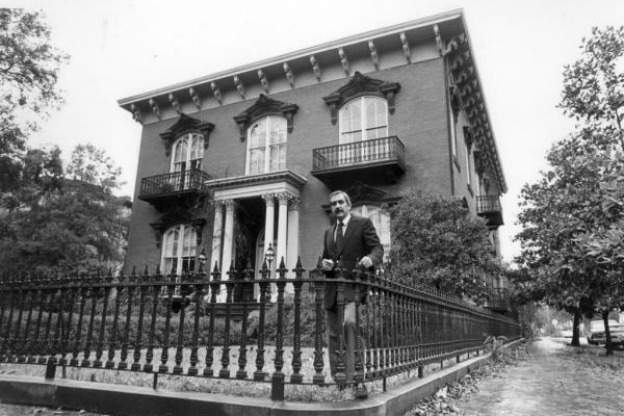
National Preservation Month begins today, and to kick it off, Bloomington's Rosemary P. Miller Lecture series presents a talk Friday evening by Will Fellows, the author of A Passion to Preserve, Gay Men as Keepers of Culture
(The University of Wisconsin Press, 2004).
In the book, Fellows documents the relatively high representation of gay men in the preservation movement, and unflinchingly examines the affinity in a way that collapses stereotypes and proposes broader definitions-not only of what it means to be gay, but also of historic preservation itself.
Why are we afraid of looking at these thingswhy do we simply have this propensity to relegate them to stereotype rather than saying what do these things reveal about us?
"There's some magical relation between gay men and restoration," writes Alan Gurganus, one of the dozens of preservationists and collectors whose first-person narratives are included in A Passion to Preserve. "You can always tell an urban neighborhood in transition by that harbinger of change-the corner Art Deco shop opened by two gentlemen friends."
Excavating Stereotypes
The statement rings true, but acknowledging that, as an outsider, feels dangerous. And it's far from the only statement in the book that seems to risk promoting a stereotype. "It's kind of a given that gay men are good at cooking and decorating," Cranford Sutton writes. Far more outrageous is Richard Jost's comment, as noted by Fellows, that the numbers of men involved in historic preservation "would seem to argue for the existence of a preservation gene, which I would guess is located very near the Broadway show-tune gene."
Far from propagating a gay male stereotype, Fellows argues that his goal was to confront it, and interrogate it
It's moving beyond the developmental stage of coming out and gaining acceptance in the world, and asking, why are we afraid of looking at these things, why do we simply have this propensity to relegate them to stereotype rather than saying what do these things reveal about us, what do they amount to as we show up in the world and go about our lives?
The anthology of autobiographical stories from gay men involved in preservation across the country-from predictable spots like Savannah and Provincetown to such unlikely locales as Red Cloud, Nebraskaexcavates the broad stereotype and replaces it with a more nuanced understanding of the trend. As Fellows explains
It provided me with so muchadmittedly anecdotalevidence to help dismiss some of the rather clichéd explanations as to why gay men are extraordinarily involved in the preservation arena. There are arguments along the lines of 'no children, so they don't have to live in safe neighborhoods with good schools,' or 'no children so they have more income'. And even an argument that I heard that gay men are marginal creatures in the culture, or have been historically, and so they are inclined to take on marginal enterprises like preservation. These are just some of the pseudo-arguments that I heard, and they all collapse when you take a close look at them.
Beyond Bricks And Mortar
If the conventionally accepted explanations don't add up, to what does Fellows attribute this affinity after all? Why or how does being gay inform the way one looks at history or objects or space? The subtext of Fellows' response defines historic preservation in a way that goes far beyond bricks and mortar
In a certain sense I see historic preservation as a religious act, religious in the original meaning of that word, having to do with putting back together something that is broken.
The preservation impulse as it gets manifested with regard to the buildings is in some ways related to the preservation impulse as it gets manifested in social work, in ministry of various kinds, in saving abused animals. There's this whole phenomenon growing out of the human soul that resonates more powerfully for some people than for others that has to do with identifying things that are in need, things that are broken, things that are not whole, not complete, and restoring them to a state of wholeness. So in a certain sense I do see historic preservation as a religious act, religious in the original meaning of that word, having to do with putting back together something that is broken.
Although Fellows' ostensible goal is to document the role of gay men in the history of American preservationand to offer a provisional etiology for that phenomenonit is the larger examination of the human impulse to rescue and restore that takes Fellows' inquiry beyond the borders of a niche market. "I [do not] box anyone in or close anyone out or draw any firm lines, because I've certainly lived long enough to know that they just don't hold up."






